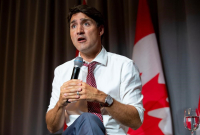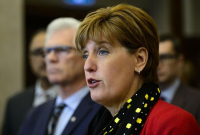Canola oil takes a hit as China and Canada's tensions intensify

Canada has requested a formal meeting with China at the World Trade Organization to resolve a Chinese ban on Canadian canola shipments.
International Trade Minister Jim Carr announced Friday that Canada is seeking a bilateral consultation at the WTO because the two sides have been unable to resolve the issue.
China's decision to ban canola shipments is part of disintegrating relations with Canada following the RCMP's December arrest of Huawei executive Meng Wanzhou in Vancouver on a U.S. extradition warrant.
Nine days later, China imprisoned two Canadian men, ex-diplomat Michael Kovrig and entrepreneur Michael Spavor, on suspicion of spying in what is widely viewed as retaliation for Meng's arrest.
Prime Minister Justin Trudeau said earlier this week that China uses arbitrary detentions as a tool to achieve its international and domestic political goals.
That comment sparked the ire of a spokesman for China's foreign ministry on Friday, who reiterated Beijing's position that Meng's arrest had no basis in law and Canada was acting as an American pawn.
Carr said in a statement that Canada's action at the WTO is part of its commitment to "rules-based international trade" on behalf of Canadian farmers who have been hit by the canola ban.
"Canada has continued to engage with China at various levels with a view to resolving the issue. In order to make progress, Canada is seeking bilateral consultations at the WTO, which is the usual next step when direct engagement does not lead to resolution," Carr said.
China blocked imports of Canadian canola seeds, alleging inspectors found pests in some shipments. The federal government says it has tried unsuccessfully to send a delegation of Canadian experts to China to examine the evidence.
The government has supplied an additional $150 million in insurance to canola farmers.
"We stand by our robust food inspection system and will continue to keep farmers, producers and other stakeholders informed of our progress," said Carr.
Saskatchewan's Trade and Export Development Minister Jeremy Harrison said Friday the federal move was months overdue.
"We'd been calling for the national government to initiate the WTO challenge from virtually Day 1 of the Chinese decision to exclude canola into their market," said Harrison.
"If they had initiated it in April, when I think was when we first asked them to do that, that would have been six months further along in this process than we are right now."
The Canola Council of Canada welcomed the government's decision because "the scientific basis for China's actions remains unclear," Jim Everson, the council president, said in a statement.
"China has an obligation to explain the scientific basis for its actions as part of its commitments to World Trade Organization rules."
—With files from Stephanie Taylor in Regina





Comments